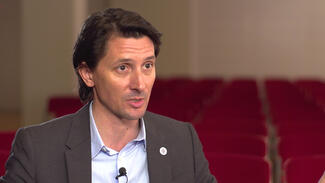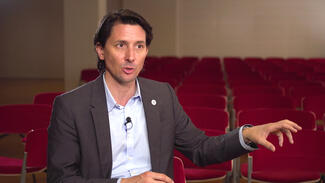
Rob Nail: How To Teach Companies Digital Future Readiness
Langfristiges Denken ist in börsennotierten Unternehmen alles andere als eine Selbstverständlichkeit, wenn sie ständig die Quartalsergebnisse im Blick haben müssen.
"I believe using the market to do good is the most powerful way to do good."
Video abspielen
In den größten Problemen der Menschheit liegen die erfolgversprechendsten Geschäftsmodelle, meint Rob Nail, Leiter der Singularity University in den USA. Er will ungewöhnliche Partnerschaften schmieden, um die ganz großen Herausforderungen der Gesellschaft anzugehen. Dazu gehört auch die akademische Bildung, denn Hochschulabschlüsse verlieren in Zeiten lebenslangen Lernens immer mehr an Wert.
The world’s biggest problems are the world’s biggest business opportunities, says Rob Nail, CEO of Singularity University. His idea is to bring uncommon partners together to address the grand challenges of society. That includes higher education, too, as the value of a degree is eroding as continous learning is becoming more and more important.
Beim Stifterverband im Video:
Die Zukunftsmacher und ihre Visionen für Bildung und Ausbildung, Forschung und Technik
Autor: Timur Diehn
Produktion: Webclip Medien Berlin
für den YouTube-Kanal des Stifterverbandes
Singularity University is not a traditional university. We do not grant degrees. That's not what we are trying to do. And many people have asked me why we call it university then. And I thought about that for some time, and I actually think that we look like what the future of the university will look like.
I believe today the degree, the concept of the degree, is changing radically. In fact, I think the degree is being eroded and needs to erode because it's focused on this single point or the single accomplishment. And today the most important aspect of education is continous learning. We have to be building adaptability to be resilient longterm. That starts from age 2 and needs to extent to age 102. We all have to be investing in our ability to adapt and learn consistently around technology and its impact in our lives. Otherwise we won't be relevant. And this is very scary to many people because it is a change of behavior that we have to undergo. But it also requires a change of our education systems and the incentives from industry groups, from the government, how we are focused today on just getting a job needs to shift. And there are many great organisations doing that. I think Singularity University is helping people understand that mindset first because you can see how fast things are moving. So just to keep up is important. For us and myself personally, I'm an entrepreneur. I'm an engineer. I like to solve problems. I don't want personally just help people see them differently. I actually want to build things and do things differently. And so we as an institution do help get involved in ideating, prototyping, scaling, investing on raw projects that we believe are aligned in taking technology to solve bigger problems, that align in solving what we call global grand challenges longterm. So we're a bit of a blend of an education institution and an accelerator and a global ecosystem that is helping connect new people and resources to problems at a bigger scale.
We work on facilitating uncommon partnerships. This is a really important part of our systems and our programmes where we do have a goal in every programme to make sure that we admit and have a mix of start-ups, corporates, corporate executives, government, government policy-makers, non-profits and foundation leaders, other academic institutions and thought leaders, and investors and finance leaders. Because if you get those six different constituency groups, you have everything you need to ideate, start, launch, scale new initiatives that could potentially make a big deal in the biggest of problems. Without anyone of those groups you actually miss a critical component to the whole entrepreneurial journey to solve a problem. And this is where we have brought our entrepreneurial Silicon Valley mindset to bear on the world's biggest problems. And we have seen many different incredible stories of local partnerships in Denmark or in Germany or in Singapore happen. These little uncommon partnerships between a start-up and a corporate group that then often will scale globally also through the Singularity community. We have hubs similiar to what we have in Germany all over the world. In fact, we have 107 chapters now around the world in almost 60 countries. And so that means there is people thinking about technology in the future and solving bigger problems throughout the world. And o if you have a great new idea for how to analyze agriculture here in Germany, when you need manufacturing help we can go to our manufacturing hub in China, and we can launch it in our hub in Argentina - tomorrow. And that's the power of a global network with a shared mindset and a shared purpose of a possible positive future that we can create.
One of the ways that we leverage our uncommon partnerships is make sure that we have partners who understand those problems, so we have lots of impact partnerships with organisations like Unicef, the World Bank, the UN World Food Programme, the World Wildlife Fund. These are organisations who every day are understanding and working on the world's biggest problems. They have on the ground efforts to understand the smallest nuance of these problems and the matter of scale of these issues. And when they are partnered with entrepreneurs in Silicon Valley who understand the technologies now you have the possibility to unlock the new solutions that no one even imagined before. So that's how an uncommon partnerhsip can really come to bear. I think a great example of how the commercial and industrial capitalist side is not disconnected or disingenuous, it's actually just a blend with the philanthropic approach as well. You need both. I believe you can do good and do well the same time. I believe using the market to do good is the most powerful way to do good. So how do you do that? One, for us we do try to frame the world's biggest problems as the biggest business opportunities. And we challenge our entrepreneurs and our students and our corporate partners to think about bigger and bigger problems, to look at those grand challenges and identify ways that they can leverage their resources, their innovations, their ideas to solve those problems. We have what's called the Ten to the Ninth Plus challenge. We have the GSP programme, Global Solutions Programme. We have a selection of students that we bring in from all over the world. They learn about exponential technologies. They learn about the grand challenges. They have to form teams and come up with an idea to impact a billion people within 10 years. So we have almost 70 start-up companies today that have come out of that programme or have come into our accelerator programme.
In 2011 a little start-up company called Matternet came out of our GSP programme. They identified that there is more than a billion people around the world who do not have consistent access to goods and services. Because the bridges will wash out or the road will wash out, and they will never have the industrial highway system in rural Nigeria like we have in Germany, right? So how do you deal with that? And so they basically took the idea of using drones, flying drones, and building a network, a network of hubs to allow drones to move medical supplies from village to village in most rural areas. They piloted that programme in the Dominican Republic, in Puerto Rico, in some refugee camps in, I think, Bhutan and a few other places, and they helped to solve a local problem.